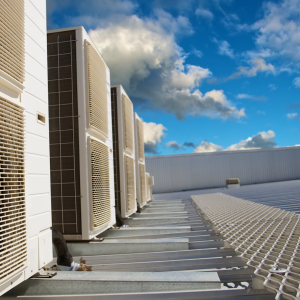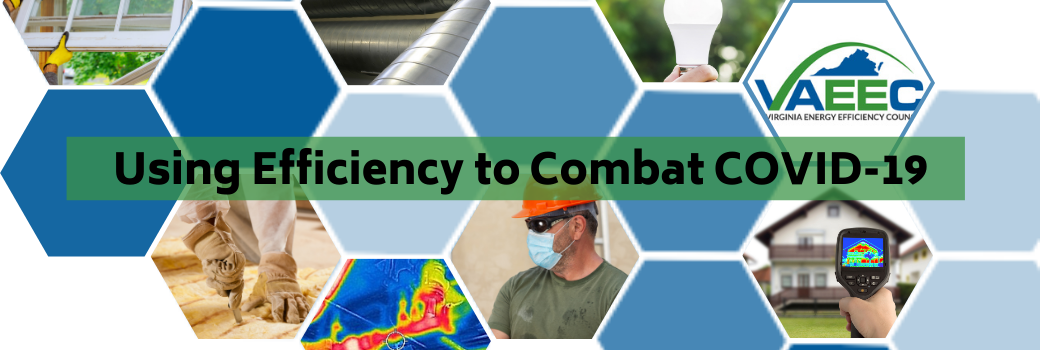Using Efficiency to Combat COVID-19, Part Two: Reopening Slowly and Safely
by Rebecca Hui, Office Manager at VAEEC
When facilities managers shut off the lights this spring, they had no idea that months later, the nation would still be in the throes of the COVID-19 pandemic. It’s no secret that this virus has irreversibly changed the world around us, and continues to do so with every new development. This three-part series will focus on the ways VAEEC members are meeting these challenges head on to keep their customers and their communities safe. You can view part one, ‘Technologies To Keep Us Safe’, here.
There’s something spooky about an empty elementary school. The tiny, untouched chairs in dim, vacant classrooms. The silent playgrounds and echoing hallways. It all evokes the tumbleweed images of an old Western ghost town. While the realities of COVID-19 have made this scene common nationwide, research shows that the virus spreads more easily indoors, and that viral load and exposure time increase the likelihood of infection. This has put a new emphasis on ventilation and indoor air quality across sectors, including school systems.
For some VAEEC members, this makes it the perfect time to get to work. “Clients are making necessary HVAC improvements or replacements to make buildings healthier and safer for the building users,” said Susan Kalergis, Marketing Communications Manager at 2RW Consultants, Inc.
Making the Case
 Energy Performance Contracting (EPC) has been an effective way for businesses and localities to make cost-saving energy efficiency upgrades without large up-front expenditures since the late 1980s. It is a budget-neutral approach to implement energy-saving improvements without using funds from capital budgets. These projects offer comprehensive energy efficiency, renewable energy, water conservation, and/or operational solutions that are tailored to the needs of the specific facility, with a guarantee that the energy savings will cover the lifetime costs of these upgrades. Here in Virginia, public bodies and state agencies can take advantage of the statewide Energy Savings Performance Contracting (ESPC) program to streamline their procurement processes.
Energy Performance Contracting (EPC) has been an effective way for businesses and localities to make cost-saving energy efficiency upgrades without large up-front expenditures since the late 1980s. It is a budget-neutral approach to implement energy-saving improvements without using funds from capital budgets. These projects offer comprehensive energy efficiency, renewable energy, water conservation, and/or operational solutions that are tailored to the needs of the specific facility, with a guarantee that the energy savings will cover the lifetime costs of these upgrades. Here in Virginia, public bodies and state agencies can take advantage of the statewide Energy Savings Performance Contracting (ESPC) program to streamline their procurement processes.
“As a vendor, we have seen two different approaches as customers attempt to deal with the pandemic. Some have totally shut down all projects and procurement. Alternatively, others have done the opposite and pursued performance contracting as a way to attack COVID-19 and other issues head on. With spaces vacant and interest rates at historic lows, several customers have moved forward with [EPC] projects,” said VAEEC Board member George Barnes, Account Manager for Complex Solutions for Trane.
While EPCs have been used for decades, the combination of low building occupancy, low interest rates, and an increased need for efficient and effective air filtration systems have made them a more attractive option to many businesses, commercial building owners, and institutions. Trane, 2RW, and other Energy Service Companies (ESCOs) are working to balance the needs of their customers with the safety of their staff as projects continue.
“With the restrictions created by COVID-19, we need to closely manage the logistics of integrating our process with [the project],” said Barnes.
Kalergis shared a similar sentiment. “[In response to the pandemic], a fundamental guiding premise was to rely on data to make thoughtful decisions, which could have long lasting implications.”
Class Dismissed
“As school districts across the country work to respond to the coronavirus, utility and energy efficiency program administrators have an important role to play in delivering solutions,” a representative from VEIC said in a recent statement. VEIC is a nonprofit organization committed to reducing the economic and environmental costs of energy use. As program administrators of the DC Sustainable Energy Utility (DCSEU), VEIC launched a variety of programs to support safe reopening strategies for schools, small businesses, and more.
 School systems across the country report that energy costs are second only to personnel in their annual budgets. With many schools either shut down or reopening with significantly reduced activities, the DCSEU developed a School Shutdown Toolkit that identified low-and-no cost ways that school systems can save energy, as well as recommending priorities for often-deferred maintenance.
School systems across the country report that energy costs are second only to personnel in their annual budgets. With many schools either shut down or reopening with significantly reduced activities, the DCSEU developed a School Shutdown Toolkit that identified low-and-no cost ways that school systems can save energy, as well as recommending priorities for often-deferred maintenance.
VEIC also launched an indoor air quality improvement program for Vermont’s K-12 schools. With a high degree of variability across schools, the program takes a customized approach to assess and improve each unique HVAC system, prioritizing efficiency wherever possible. Typically, increases in ventilation and filtration result in an increase in energy use, but by leveraging equipment controls and efficient equipment, these programs help schools keep energy increases manageable.
“For sustainability advocates, the push for improved indoor air quality is not new; and it has always been an important part of [our] designs and equipment specifications,” said Kalergis. “While not every technique and technology may be advantageous for every building, we advise building owners and facilities operators that techniques for [their] specific building types—such as education or healthcare—are proven to be effective and worth considering.”


 When looking to significantly reduce energy costs of a state facility, a state agency can enter into an energy performance-based contract with an energy performance contractor. This Energy Performance Contract, or EPC, is an agreement between a contractor or energy services company (ESCO) and a customer to meet a guaranteed level of energy savings as a condition of payment.
When looking to significantly reduce energy costs of a state facility, a state agency can enter into an energy performance-based contract with an energy performance contractor. This Energy Performance Contract, or EPC, is an agreement between a contractor or energy services company (ESCO) and a customer to meet a guaranteed level of energy savings as a condition of payment.